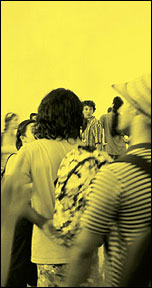Líneas de investigación
Proyectos en Curso
Proyectos Anteriores
 Desacuerdos
Desacuerdos  Seminar Mass Media, the Multitude and Antagonistic Practices
Seminar Mass Media, the Multitude and Antagonistic Practices
Seminar Mass Media, the Multitude and Antagonistic Practices |
|
Venue: Diputación de Granada. Palacio de los Condes de Gabia. Plaza de los Girones s/n. Granada
PRESENTATIONPRESENTATION
After the death of Dictator Francisco Franco and with the establishment of democracy in Spain, it was logical those elements that, from society's base, formed popular culture would be encouraged. However, since the sixties the capitalist machine had already begun its process of merchandising such forms of popular expression. Control of the new media and the expropriation of the old placed mass culture at the very centre of the struggles being waged against Francoism. Cinema, television, popular music, comics, party iconography… all were subject to an antagonistic tension, to social struggle and political conflict. Moreover the trend within international capital known as pop culture coincided with the reconversion of popular wisdom - autochthonous music, suburban cultures, national identities etc. by populist Francoism under the protective wing of the feminine section, mannerism, and regional traditions. The insrumentalisation of this popular potential by the regime meant that this de facto victory achieved nothing more that to make the public sphere banal. However, we can observe that in the most radical manifestations of these popular movements signs of resistance appear, transformation tools of use in the reconstruction of a critical culture for challenging a present characterised by the manner in which popular culture was converted into spectacle. Therefore in the documented political practices and in the counter-information gathered from collectives of independent film-makers -before the large communications companies imposed their legal hegemony; in the leisure breaches opened in a monopolistic information system by reading cartoon strips or comics - with the importance of social rank that each of these terms denotes; in the radical struggle by political iconographers in which agit-prop succumbed before the publicity pressure of popularity - rendered banal by the ideological substitution of Guernica by stag hunting or of Che Guevara by the Sacred Heart of Jesus. In the first moments of underground movements of Barcelona's Rrollo or Madrid's movida we can detect the countercultural tools of resistance and tools criticising situational genealogy - before they became merely the most fashionable element in cultural tourism's offer. In a present where the culture of mass-consumption "wants" to transform itself into the multitude's general and common knowledge, we have taken these examples as places in which we can exercise our critical faculties and stimulate debate - instead of subtracting we are uniting forces in order to bring about the said transformation.
PROGRAMMEPROGRAMME
Tuesday, April 19th 2005
· 17:00 h.
· 19:00 h.
· 20:30 h.
· 17:00 h.
· 19:00 h.
· 20:30 h.
· 17:00 h.
· 19:00 h.
· 20:30 h.
· 17:00 h.
· 19:00 h.
· 20:30 h.
Place: Diputación de Granada. Palacio de los Condes de Gabia. Plaza de los Girones s/n. Granada
GUESTSGUESTS
Julio Pérez Perucha is part
of the Autonomous University of Barcelona's Masters in the Theory and
Practice of Creative Documentaries team as well as being the Professor
of Cinema in Valladolid University. He was secretary of the Cien años
de cine [one hundred years of cinema] association and in charge of
publications and research for the Committee to Celebrate Spanish Cinematography's
Centenary. Co-founder of the Spanish Association of Cinema Historians,
he is also at present its President. He is a founder-member of the magazine
Contracampo and belongs to the editorial board of the Cinema History
magazine Secuencias.
Antonio Martín focuses his activities principally
upon research into the History and Sociology on Industry, Publications
and Authors of the Spanish Comic and his publications are mainly in the
same fields. He also works as an editor for different Spanish book and
newspaper publishers.
Antonio Orihuela is Doctor of History, teacher
and poet. He has coordinated the Juan Ramón Jiménez Foundation's
Poet's Meetings Voces del Extremo since 1999. Among the last books
he has published, worthy of special mention are: Piedra, corazón
del mundo [Stone, Heart of the World] publ. Germania, Valencia, 2001;
Narración de la llovizna [Narration of the Drizzle] publ.
Baile del Sol, Tenerife 2003; El mal: técnicas de análisis
y prospección superficial [Evil: Analysis Techniques and Superficial
Prospection] Diputación de Badajoz, 2004; X Antonio Orihuela,
LF Ediciones, Béjar, 2005; La piel sobre la piel [Skin upon
Skin] Ediciones de la Mano Vegetal, Seville, 2005.
Lolo Rico is an Academic of Television Arts and
Sciences in both Spain and the United States and an honorry researcher
in the Complutense University of Madrid's Social Sciences and Philosophy
research team. She was director of the television programme La Bola
de Cristal [The Crystal Ball] and author of the following publications:
Televisión fábrica de mentiras [Television, Factory
of Lies], El Libro de La Bola de Cristal [The Book of La Bola de
Cristal ] and Carta de una madre de izquierdas a una hija de derechas
[Letter from a Left-Wing Mother to a Right-Wing Daughter].
|

 Disagreements organizes a symposium on mass media
and popular culture, their antagonistic influence upon the visual constructs
of the art institution, the legitimacy granted them by the State's policies
and the coincidences and confusions that we understand the public sphere
to be.
Disagreements organizes a symposium on mass media
and popular culture, their antagonistic influence upon the visual constructs
of the art institution, the legitimacy granted them by the State's policies
and the coincidences and confusions that we understand the public sphere
to be.